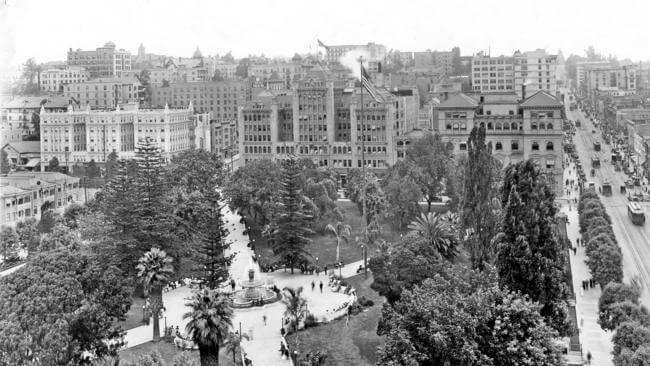The Flâneur & The City: Hill Street
For the latest installment of urban historian Richard Schave’s site-specific discussion series “The Flâneur & The City,” Richard (Esotouric bus adventures, In SRO Land) is joined by architectural historian Nathan Marsak (1947project, On Bunker Hill).
On this excursion we’ll be casting our eyes along on one fascinating, but underappreciated, downtown boulevard: Hill Street.
The tour begins at Alfred Rosenheim’s Hamburger’s Department Store (the People’s Store) at Eighth Street and concludes high atop Bunker Hill, with a focus on the most interesting buildings along the way, and poignant memorials for a few that have fallen to the wrecking ball. The last stop will be at Fort Moore Memorial, where Hill Street meets the 101 freeway, a drab, functional place that now occupies what was once one of the most lyrical corners of old Los Angeles. We’ll share photos of the neighborhood’s beloved funicular Court’s Flight (Angels Flight’s forgotten competition), the Victorian mansions of Bunker Hill, and explain how the Hill Street Extension of 1959 destroyed this part of Bunker Hill and took out a large part of the even more ancient neighborhood of Sonora Town.
Tour attendees will meet on the 8th floor lounge of the Los Angeles Athletic Club. The snack bar will be open, and those who wish to purchase a sandwich or beverage before the walk are encouraged to arrive 20 minutes early to avoid a bottleneck. We will start with general historic overview of Hill Street in the lounge, and then make our way to Hamburger’s–no doubt following in the path of that store’s founder Moshe Hamburger, who lived at the Athletic Club in the early years of the 20th century.
ABOUT THE TOUR SERIES: “The Flâneur & The City” is an ongoing attempt to explore some of the more important issues revealed by the constantly changing heart of the metropolis. The core notion of the series is of culture and history as commodities that are packaged and sold to a target demographic; meanwhile, it’s the ignored and seemingly worthless scraps of meaning found on the sidewalks and marketplaces where the true remnants of positive public space can be found. All interpretations and nuisances of the word flâneur are examined—from the modern-day aesthete dreaming of Baudelaire while carried along in the human tide past the stalls and shops of Broadway, to its more recent and perhaps relevant use, someone who is loitering. At its heart this series is a celebration of the simple act of getting out of your car, walking through a neighborhood and learning to see it with your own eyes.
